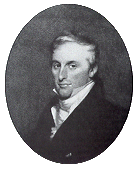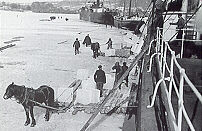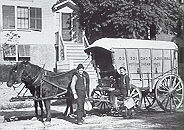February 2003
BOOK REVIEW
- by Carol Standish
 As the nineteenth century marched on, an increasingly sizeable portion of the Western world was stirred, not shaken, by the entrepreneurial brainstorm of one Frederic Tudor. A �diminutive, pig-headed� Bostonian, Tudor was one of the most remarkable businessmen of his times. The Frozen Water Trade by Gavin Weightman (Hyperion, 247pp, $23.95) is the story of the man �who dedicated most of his life to supplying ice to the tropics,� long before the invention of artificial refrigeration.
As the nineteenth century marched on, an increasingly sizeable portion of the Western world was stirred, not shaken, by the entrepreneurial brainstorm of one Frederic Tudor. A �diminutive, pig-headed� Bostonian, Tudor was one of the most remarkable businessmen of his times. The Frozen Water Trade by Gavin Weightman (Hyperion, 247pp, $23.95) is the story of the man �who dedicated most of his life to supplying ice to the tropics,� long before the invention of artificial refrigeration.
During his privileged childhood Frederic and his siblings enjoyed ice cream and iced drinks in the summer. Ice cut from the farm pond in winter was stored in an icehouse for the express purpose of warm weather refreshment. In the summer of 1805, Frederic, then 22, and his older brother William were enjoying that very luxury at a family picnic when it dawned on Frederic (so the story goes) that there was money to be made shipping such a commodity to the West Indies and other hot climates. and his siblings enjoyed ice cream and iced drinks in the summer. Ice cut from the farm pond in winter was stored in an icehouse for the express purpose of warm weather refreshment. In the summer of 1805, Frederic, then 22, and his older brother William were enjoying that very luxury at a family picnic when it dawned on Frederic (so the story goes) that there was money to be made shipping such a commodity to the West Indies and other hot climates.
The first square-rigged sailing vessel to carry a cargo of ice left Boston on February 10, 1806. The departure was reported in the Boston Gazette: �No joke. A vessel with a cargo of 80 tons of Ice has cleared out from this port for Martinique. We hope this will not prove to be a slippery speculation.� Unfortunately it was. Tudor had not anticipated the two largest inhibitions to his success: an insulated place to store the ice was yet to be built on the island and the islanders hadn�t a clue what to do with it. His projected profit melted away while he futilely tried to expand his customer base beyond the few ice cream makers on the island. Tudor calculated his losses for that first venture at between three and four thousand dollars�his total sales about two thousand. �No joke. A vessel with a cargo of 80 tons of Ice has cleared out from this port for Martinique. We hope this will not prove to be a slippery speculation.� Unfortunately it was. Tudor had not anticipated the two largest inhibitions to his success: an insulated place to store the ice was yet to be built on the island and the islanders hadn�t a clue what to do with it. His projected profit melted away while he futilely tried to expand his customer base beyond the few ice cream makers on the island. Tudor calculated his losses for that first venture at between three and four thousand dollars�his total sales about two thousand.
Undaunted, Tudor went on to ship and sell ice to other West Indian Islands, Cuba, the southern cities of the United States (1817), Britain, and even India (1833), perfecting methods of cutting, packing and insulating his invented commodity for storage on land and on shipboard. Over the years, �he suffered the humiliation of bankruptcy, was jailed for debt, endured a mental breakdown,� fathered six children in his dotage and lived until he was 80 on his Nahant estate, having become � �inevitably� and �unavoidably� rich.� southern cities of the United States (1817), Britain, and even India (1833), perfecting methods of cutting, packing and insulating his invented commodity for storage on land and on shipboard. Over the years, �he suffered the humiliation of bankruptcy, was jailed for debt, endured a mental breakdown,� fathered six children in his dotage and lived until he was 80 on his Nahant estate, having become � �inevitably� and �unavoidably� rich.�
Author Gavin Weightman, a London journalist, was intrigued by a bit of his native city�s history when, while researching another topic, he ran across an article describing a shop window on The Strand in the 1840s, �in which a large cube of crystal-clear ice about two feet square was displayed every day in the summer. Sometimes a colorful New England fish called a �pickerel� would be frozen into the block�� Queen Victoria, it seems, enjoyed a supply of ice from Massachusetts.
This weird little visual snippet worked on Weightman�s mind until he dug up the facts and wrote the book. He did not waste his time. The story is full of oddball Yankee characters, both ingenious and eccentric, some dirty tricks, spectacular financial ruination and recovery, just a smattering of boggling statistics and a whiff of infidelity. Weightman writes in a no frills journalistic style and his pacing and organization of the story keep the reader reading�just one more chapter. The book is handily indexed but misses a bibliography. The subject is so intriguingly presented that one is encouraged to read more, especially about specific regions of frantic activity such as the Kennebec River in Maine and the Great Lakes region. characters, both ingenious and eccentric, some dirty tricks, spectacular financial ruination and recovery, just a smattering of boggling statistics and a whiff of infidelity. Weightman writes in a no frills journalistic style and his pacing and organization of the story keep the reader reading�just one more chapter. The book is handily indexed but misses a bibliography. The subject is so intriguingly presented that one is encouraged to read more, especially about specific regions of frantic activity such as the Kennebec River in Maine and the Great Lakes region.
Particularly charming is Weightman�s British take on canonic literary heroes like Henry David Thoreau (ice was cut from Walden Pond while he resided in his famous cabin on its banks) and incidents in American history such as the War of 1812 and the Civil War. The inclusion of excerpts of ships� logs also contributes to the color and liveliness of the book.
The fact that the entire mammoth industry which employed thousands and soothed millions for over a century faded into oblivion with barely a trace, replaced by the next invention�artificial refrigeration is almost as fantastic as the original idea. It is indeed fortunate that Weightman�s subconscious couldn�t let go of the Massachusetts pickerel. that the entire mammoth industry which employed thousands and soothed millions for over a century faded into oblivion with barely a trace, replaced by the next invention�artificial refrigeration is almost as fantastic as the original idea. It is indeed fortunate that Weightman�s subconscious couldn�t let go of the Massachusetts pickerel.
|
 As the nineteenth century marched on, an increasingly sizeable portion of the Western world was stirred, not shaken, by the entrepreneurial brainstorm of one Frederic Tudor. A �diminutive, pig-headed� Bostonian, Tudor was one of the most remarkable businessmen of his times. The Frozen Water Trade by Gavin Weightman (Hyperion, 247pp, $23.95) is the story of the man �who dedicated most of his life to supplying ice to the tropics,� long before the invention of artificial refrigeration.
As the nineteenth century marched on, an increasingly sizeable portion of the Western world was stirred, not shaken, by the entrepreneurial brainstorm of one Frederic Tudor. A �diminutive, pig-headed� Bostonian, Tudor was one of the most remarkable businessmen of his times. The Frozen Water Trade by Gavin Weightman (Hyperion, 247pp, $23.95) is the story of the man �who dedicated most of his life to supplying ice to the tropics,� long before the invention of artificial refrigeration.
 and his siblings enjoyed ice cream and iced drinks in the summer. Ice cut from the farm pond in winter was stored in an icehouse for the express purpose of warm weather refreshment. In the summer of 1805, Frederic, then 22, and his older brother William were enjoying that very luxury at a family picnic when it dawned on Frederic (so the story goes) that there was money to be made shipping such a commodity to the West Indies and other hot climates.
and his siblings enjoyed ice cream and iced drinks in the summer. Ice cut from the farm pond in winter was stored in an icehouse for the express purpose of warm weather refreshment. In the summer of 1805, Frederic, then 22, and his older brother William were enjoying that very luxury at a family picnic when it dawned on Frederic (so the story goes) that there was money to be made shipping such a commodity to the West Indies and other hot climates.
 �No joke. A vessel with a cargo of 80 tons of Ice has cleared out from this port for Martinique. We hope this will not prove to be a slippery speculation.� Unfortunately it was. Tudor had not anticipated the two largest inhibitions to his success: an insulated place to store the ice was yet to be built on the island and the islanders hadn�t a clue what to do with it. His projected profit melted away while he futilely tried to expand his customer base beyond the few ice cream makers on the island. Tudor calculated his losses for that first venture at between three and four thousand dollars�his total sales about two thousand.
�No joke. A vessel with a cargo of 80 tons of Ice has cleared out from this port for Martinique. We hope this will not prove to be a slippery speculation.� Unfortunately it was. Tudor had not anticipated the two largest inhibitions to his success: an insulated place to store the ice was yet to be built on the island and the islanders hadn�t a clue what to do with it. His projected profit melted away while he futilely tried to expand his customer base beyond the few ice cream makers on the island. Tudor calculated his losses for that first venture at between three and four thousand dollars�his total sales about two thousand.
 southern cities of the United States (1817), Britain, and even India (1833), perfecting methods of cutting, packing and insulating his invented commodity for storage on land and on shipboard. Over the years, �he suffered the humiliation of bankruptcy, was jailed for debt, endured a mental breakdown,� fathered six children in his dotage and lived until he was 80 on his Nahant estate, having become � �inevitably� and �unavoidably� rich.�
southern cities of the United States (1817), Britain, and even India (1833), perfecting methods of cutting, packing and insulating his invented commodity for storage on land and on shipboard. Over the years, �he suffered the humiliation of bankruptcy, was jailed for debt, endured a mental breakdown,� fathered six children in his dotage and lived until he was 80 on his Nahant estate, having become � �inevitably� and �unavoidably� rich.�
 characters, both ingenious and eccentric, some dirty tricks, spectacular financial ruination and recovery, just a smattering of boggling statistics and a whiff of infidelity. Weightman writes in a no frills journalistic style and his pacing and organization of the story keep the reader reading�just one more chapter. The book is handily indexed but misses a bibliography. The subject is so intriguingly presented that one is encouraged to read more, especially about specific regions of frantic activity such as the Kennebec River in Maine and the Great Lakes region.
characters, both ingenious and eccentric, some dirty tricks, spectacular financial ruination and recovery, just a smattering of boggling statistics and a whiff of infidelity. Weightman writes in a no frills journalistic style and his pacing and organization of the story keep the reader reading�just one more chapter. The book is handily indexed but misses a bibliography. The subject is so intriguingly presented that one is encouraged to read more, especially about specific regions of frantic activity such as the Kennebec River in Maine and the Great Lakes region.
 that the entire mammoth industry which employed thousands and soothed millions for over a century faded into oblivion with barely a trace, replaced by the next invention�artificial refrigeration is almost as fantastic as the original idea. It is indeed fortunate that Weightman�s subconscious couldn�t let go of the Massachusetts pickerel.
that the entire mammoth industry which employed thousands and soothed millions for over a century faded into oblivion with barely a trace, replaced by the next invention�artificial refrigeration is almost as fantastic as the original idea. It is indeed fortunate that Weightman�s subconscious couldn�t let go of the Massachusetts pickerel.